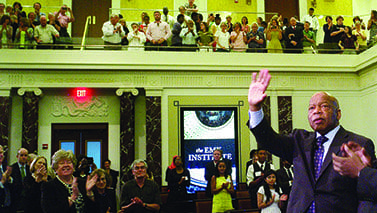Rep. Lewis cites attacks on Voting Rights Act
Congressman speaks at Edward M. Kennedy Institute

At age 75, the mind of Congressman and civil rights leader John Lewis (D-Georgia) is still on freedom. He recently appeared before a packed crowd at the Edward M. Kennedy (EMK) Institute in Boston to talk about the 50th Anniversary of the Voting Rights Act.
“We have made a lot of progress but we are not there yet,” Lewis said. “We should make voting simple and easy. Forces in our country want us to stand still. But we must move forward. We must open up the voting process for the people.”
Lewis cited the historic Voting Rights Act of 1965, which he said today is under siege. In 2013, the U.S. Supreme Court struck down part of the historic law and ruled that parts of the act are unconstitutional. Supreme Court Justice Roberts explained the decision by saying, “our country has changed for the better.” Lewis said the court put “a dagger in the heart of the Voting Rights Act.”
Last month, Lewis joined other congressional Democrats in filing legislation called the Voting Rights Advancement Act to update and fix the law. Sponsors say the companion bills in the House and Senate target “voting practices known to suppress the voting rights of minorities and the disabled.”
In North Carolina, the U.S. Justice Department is suing the state over broad election changes passed two years ago. A key provision of that law narrowed the early voting period, which had resulted in a surge of minority voters. The outcome of the federal case now underway in North Carolina could impact voting rights across the country — particularly in light of the 2016 presidential election.
In conversation with Boston Globe columnist Adrian Walker at the EMK Institute, Lewis said if the feds lose the case in North Carolina, it could go back to the Supreme Court. He noted that supporters of the new congressional voting rights bill will meet in early August in Atlanta to strategize ways to move the new legislation forward.
For Lewis, this is the latest round in the fight for voting rights. He was among some 600 civil rights marchers beaten on “Bloody Sunday,” March 7, 1965 at the Edmund Pettus Bridge as they tried to make their way from Selma to Montgomery, Alabama, demonstrating for voting rights.
At that bridge, state and local lawmen attacked them with billy clubs, tear gas and dogs, driving them back to Selma. Two days later, Reverend Doctor Martin Luther King, Jr. led a “symbolic” march to the bridge.
Then the civil rights leaders got a court order allowing them to march. On Sunday, March 21, some 3,200 marchers set out for Montgomery. By the time they reached Montgomery on Thursday, March 25, Lewis said, the marchers were 35,000 strong.
A few months later in August, President Johnson signed the Voting Rights Act into law. Lewis commended the late Senator Edward Kennedy for supporting the bill. Visitors to the new EMK Institute at Harbor Point will see the written roll call of the senate vote on the legislation with the signatures of both Senators Edward and Robert Kennedy.
Among those listening to Lewis were students from several Boston public schools including NAACP summer interns, UMass Boston Project Reach, Upward Bound and Urban Scholars.
For those young people sitting in the EMK Institute’s stunning replica of the U.S. Senate Chamber, Lewis’ story was both an inspiring history lesson and a cautionary tale about the importance of the ongoing struggle for civil rights.






